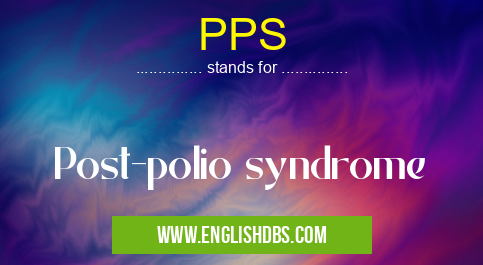What does PPS mean in PEDIATRIC
PPS (Post-polio syndrome) is a condition that can affect people who have had polio in the past. Polio is a virus that can cause paralysis, and PPS can develop years or decades after the initial infection.

PPS meaning in Pediatric in Medical
PPS mostly used in an acronym Pediatric in Category Medical that means Post-polio syndrome
Shorthand: PPS,
Full Form: Post-polio syndrome
For more information of "Post-polio syndrome", see the section below.
PPS Symptoms
The symptoms of PPS can vary from person to person, but they may include:
- Muscle weakness
- Fatigue
- Joint pain
- Difficulty breathing
- Difficulty swallowing
- Speech problems
- Cognitive problems
PPS Causes
PPS is caused by damage to the motor neurons in the spinal cord and brain. These neurons are responsible for sending signals to the muscles, and when they are damaged, the muscles can become weak or paralyzed.
PPS Diagnosis
PPS is diagnosed based on a person's history of polio and their current symptoms. There is no specific test for PPS, but a doctor may order tests to rule out other conditions.
PPS Treatment
There is no cure for PPS, but there are treatments that can help to manage the symptoms. These treatments may include:
- Physical therapy
- Occupational therapy
- Speech therapy
- Medications
- Assistive devices
PPS Prognosis
The prognosis for PPS varies from person to person. Some people may experience only mild symptoms, while others may have more severe symptoms that can affect their daily lives.
Essential Questions and Answers on Post-polio syndrome in "MEDICAL»PEDIATRIC"
What is Post-Polio Syndrome (PPS)?
PPS is a condition that can occur decades after a person has recovered from polio. It is characterized by muscle weakness, fatigue, pain, and difficulty breathing or swallowing.
Who is at risk for PPS?
People who have had polio, regardless of the severity of their initial illness, are at risk for PPS. The risk of developing PPS increases with age.
What are the symptoms of PPS?
The symptoms of PPS can vary from person to person and can include:
- Muscle weakness, especially in the legs
- Fatigue
- Pain
- Difficulty breathing or swallowing
- Sleep problems
- Cognitive problems
- Emotional problems
How is PPS diagnosed?
There is no specific test for PPS. The diagnosis is based on a person's history of polio and their current symptoms. A doctor may also order tests to rule out other conditions.
How is PPS treated?
There is no cure for PPS, but treatment can help manage the symptoms. Treatment may include:
- Physical therapy
- Occupational therapy
- Speech therapy
- Medications
- Assistive devices
Can PPS be prevented?
There is no way to prevent PPS, but getting vaccinated against polio can help reduce the risk of developing the condition.
What is the prognosis for PPS?
The prognosis for PPS varies from person to person. Some people may experience only mild symptoms, while others may have more severe symptoms that can affect their quality of life.
Final Words: PPS is a complex condition that can affect people who have had polio in the past. The symptoms of PPS can vary, but they may include muscle weakness, fatigue, joint pain, and difficulty breathing. There is no cure for PPS, but there are treatments that can help to manage the symptoms.
PPS also stands for: |
|
| All stands for PPS |
